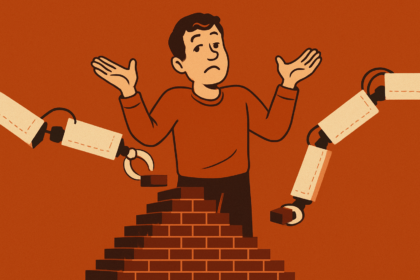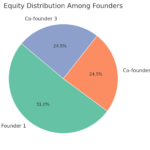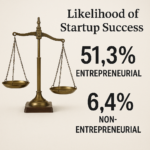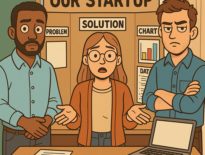
It’s always amusing when mainstream media stumbles into a conversation the rest of us have been having for, oh, I don’t know… decades?
This week, The Economist decided to pose the bold question: “Are startup founders different?” as if it’s some new frontier of behavioral science. Imagine walking into a neuroscience conference and breathlessly announcing that sleep is important, only to find out the keynote was literally titled “The Cognitive Impact of Sleep Deprivation” and started three hours ago.
Yes, startup founders are different. They have to be. And no, this isn’t up for debate in any serious academic, psychological, or entrepreneurial circle. Just as a startup is distinct from a new business, a founder is different from a business owner. The real news is that mainstream media keeps floating this question it’s some inspired realization.
Researchers at institutions like MIT, Harvard, Stanford, and Oxford have long studied the behavioral traits and cognitive wiring of founders. This question should no longer be clickbait; grounded in empirical, peer-reviewed work, when society continues questioning a difference, it also enables the presumption that they’re not different (we don’t ask if there is oxygen in the air because it’s a foregone point of fact). For example, a 2023 study revealed that successful startup founders tend to exhibit a “remarkably similar personality profile” — notably: higher openness to experience, greater conscientiousness, and lower agreeableness (yes, being a little disagreeable helps). Why? Because being the founder of a startup is not the same as starting a new business. Founders are wired to see opportunity where others see chaos, to obsess over solving things no one else cares enough to notice, and to persist long after the rational brain would have filed for Chapter 7.
Psychologists like Saras Sarasvathy have articulated entire frameworks (like effectuation theory) that explain how founders think fundamentally differently from managers. Instead of starting with a goal and acquiring the means to reach it, founders start with what they have and imagine what they can create. It’s not just risk tolerance; it’s uncertainty obsession. It’s not just being visionary; it’s often borderline delusional… and that’s not a bug, it’s a feature.
Meanwhile, venture capital firms have baked this into their investment theses. Entire portfolios are built around founder-market fit; essentially, a bet on whether a founder has the unique grit, obsession, and irrational conviction to outlast and outlearn their competition. You don’t need a headline in The Economist to realize why Y Combinator’s interviews look more like psychological warfare than business pitches. Product-Market Fit is a concept used to help people understand how startups work; when it’s clearly established that the Team is the more important factor in the success of a startup, we’re not actually looking for Product-Market Fit, we’re trying to discern if the founders fit.
The industry’s dirty little secret? We’ve already optimized for the fact that founders are weird. It’s just that mainstream media still talks about startups the way National Geographic talks about undiscovered tribes: with awe, distance, and a hint of patronizing fascination.
So sure, it’s cute that the question keeps being asked because it draws more attention to the startup sector, but we need to be careful that the question asked does not mean that the answer is unknown or newly discovered. Startups are different from new businesses. Founders are unusual and not likely the person opening that new business in town. What I’d love to see more of is that mainstream media digs deeper into the real implications so that investors, advisors, and policy makers can better serve: if founders are different, why are most support systems — from banking to healthcare to education — built for not founders? Why do we push aspiring entrepreneurs into MBA programs that groom them for middle management rather than teach them to break the rules intelligently? Why do government grant programs punish volatility when volatility is the essence of creation?
Here’s a better headline: “The World Still Doesn’t Understand Founders — And It’s Killing Innovation.”
If you’re still waiting for polite society to validate your founder DNA, stop. The data’s in: You’re not normal. And that’s exactly the point.
Now what systems need to change because of that?








We are…
we entrepreneurs, creative types, dreamers come up with amazing ideas. What we need is people who can handle the monetization. If you want to see or learn how our minds work, look at our desks, files, or organization of things on our laptop. I’ll bet you that every one of us has a desk that looks like a bomb hit it. Yet, we know where everything is located.
I’m normal = not normal – great read
We really are born with the desire & need to create and experiment.
Maryann Kilgallon systemic education is designed to make people manageable and employable. We literally remove the entrepreneur from most.
A big part of the problem is people who think they are good start-up founders, but aren’t. They have been seduced by the VC mantra of found-and-raise before they create any value. Good start-up founders prove their worth by bootstrapping to some success. That proves they can operate in chaos, and create value from nothing. Eventually, VCs are clamoring to invest in these people, so they don’t need to raise, just choose.
Steve Jennis in fairness though, that isn’t a VC mantra. I don’t know a VC out there that funds founders just to try.
If anything it’s a societal issue, with people expecting funding and people criticizing the VC model for *not* funding them.
Paul O’Brien It’s how VC generate pipeline from which to choose their investees. Accelerators, pitch competitions, incubators, etc.. are all part of VCs’ own GTM. People only expect funding because VCs dangle the carrot…even if they only invest in 1% of their applicants. It’s just like lottery marketing.
not in Texas they’re not. Actual VC support of incubators and accelerators is crap here, they barely show up for graduation events, which itself is nothing more than a participation trophy.
And still, regardless of that, most of the SDOs in Texas are ineffectual and meaningfully changing the rate of success so VC should only be supporting about 1% anyway.
Again, not VC fault. MAYBE founders could expect some Angel investor access out of an incubator, but even then, Texas Angels tend to join Groups instead of being known directly so they’re not going to be very prolific in programs because they don’t like the exposure.
Paul O’Brien People complain about the lack of early VC in Houston, I think that’s a good thing for founders. They have to prove their worth first and don’t get tempted to sacrifice their equity too cheaply. Austin has seen an early VC bubble that is now bursting, that bursting is good too. All in all, Texas founders are doing just fine by not adopting SV culture – which was invented by VCs for the benefit of VCs. Keeping it real works for the best type of founders, if not the glory-chasers seduced by the unicorn lottery.
Watch the explosion of venture studios spitting out the same advice and programs, and continually ignore their opportunity to explore unmet needs and painpoints to solve for; like maybe learning about analytical minds and providing them with safe spaces to execute in their own authentic flow state.
Carol Amen!
So true and sad. The creativity is taught out of students at young age to make them conform to what employers need.
Totally agree Paul O’Brien. Founders aren’t small-biz managers, they’re builders of something that doesn’t exist yet. Enable them and let their quirks drive the breakthrough. Unfortunately we tend to take the thing (or person) that’s different and then try to force them into ‘same’, which defeats the entire purpose.
The reasonable man adapts himself to the world. The unreasonable one persists in trying to adapt the world to himself.
Therefore all progress depends on the unreasonable man.” – George Bernard Shaw
“My therapist told me, I was outta my mind!”…so too did several corporate-type bosses…
Entrepreneurs, founders, and start up teams simply lean-in even more!
Paul A. Bell yep. Companies will try to train or manage it out of you, and if you’re the type to just double down (I was), you’re clearly in the wrong place (and they clearly don’t know what they’re doing with what they have)
I learned a lot when my first startup failed.
My wife divorced me when I then decided to use that knowledge straight away and do it again.
Founders can be hard to get on with and you are right: most innovation programs are designed by managers for managers.
Simon Haworth “most innovation programs are designed by managers for managers.” exactly. I’m going to tag Dana Spano because we’ve been talking about this a bit as it pertains to making entrepreneurship sustainable.
Thanks for looping me in! Loved the bit at the end: “Start designing for the people who don’t fit, because that’s where the breakthroughs come from.”
This is coincidentally super relevant for us at Entreprana right now, as we’re in the process of 1) dropping the focus on management of startup stress to helping founders tee up for key moments (which just so happens to neutralize stressors and re-energize through the moment); and 2) shifting our approach to make the app as low-touch as possible, making Recalibrate available via text message.
Founders are a unique breed with world-changing visions and proclivities. They need to be enabled and enlivened, not stifled by management.